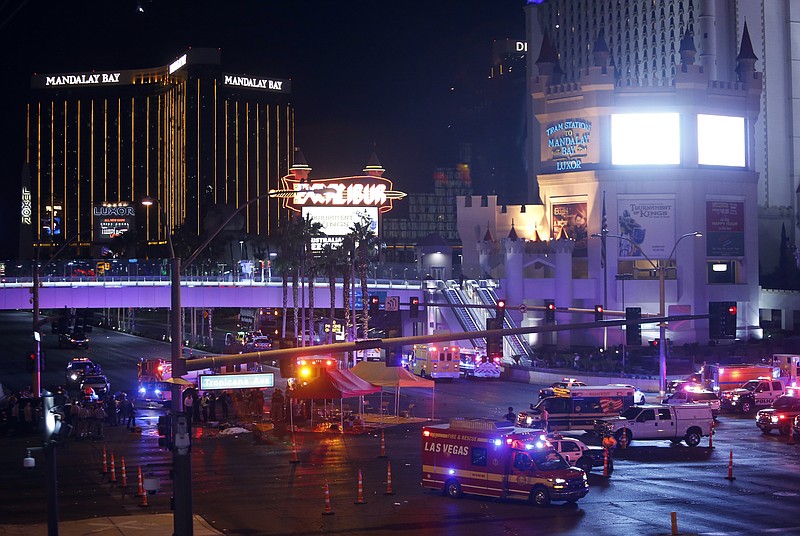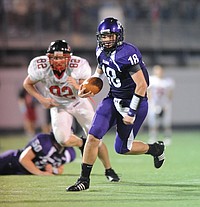The American League wild-card playoff game between the visiting Minnesota Twins and New York Yankees gets under way tonight at 8 on ESPN. The National League's wild-card contest begins at 8 p.m. Wednesday with the Colorado Rockies on the road against the Arizona Diamondbacks.
It should be the best time of the year for baseball fans the nation over. It's the postseason. Every pitch, catch and swing of the bat truly matters. It's all become so big that October no longer necessarily can contain it. If this year's World Series goes the full seven games, it will end on Nov. 1.
But how do you find even the slightest energy or enthusiasm for America's Pastime after watching and reading about a madman's massacre of 59 people - and it could be 60 or more by the time you read this - in Las Vegas?
How comfortable should any of us be to join a crowd of thousands of people in an open-air venue after the carnage allegedly wrought by a single gunman using multiple rapid-fire weapons of dizzying mass destruction?
Is this an outlier or an outing of growing evil most sinister and prolific?
Not 18 months have passed since the Pulse night club shooting in Orlando, Fla., left 49 dead and 58 others wounded. That was the worst such attack in United States history. Was. Until this. Until at least 59 killed and more than 500 wounded.
What does this have to do with sports, with Major League Baseball playoffs in particular? Not much, except it should have much to do with our mindsets and priorities as we now watch them, as well as the collegiate and professional football games we'll view later this week and next week and beyond.
We are a nation that seems no longer to be fraying at the edges but down the middle. Anger and frustration and fear and doubt are in abundance on all sides. The apparent murderer in this case was the son of a bank robber the feds once described as "psychopathic" during his time on the FBI's 10 Most Wanted List. Behavioral traits are inherited, both good and bad.
Was Stephen Paddock a terrorist in the classic sense, overcome by some deeply disturbing desire to wipe out the infidels, whoever those perceived enemies of his warped belief system were? We don't know that. There is zero evidence of that as I prepare to wrap up this column at 9:08 Monday evening.
What we know is that no one seems to have known much of anything unusual about him beyond the fact that he liked to gamble with large amounts of money. Law enforcement said his home was "very neat (as in clean)" when it was searched, and past neighbors said he was always willing to share yard tools and the like. He recently had a walker shipped to his mom in Florida because she was struggling to get around.
If you can find a concrete clue to Paddock's intentions to mame and murder in those tidbits, you're Eliot Ness 2.0.
But somewhere, at some point, something went horribly wrong in this 64-year-old madman's monstrous mind. He snapped. At least that would seem to be the case. And the result of that implosion has us all on edge again.
So what does this have to do with sports? Not much. Not directly. My assignment at Monday's dawn was to write about the Atlanta Braves and another year outside the playoffs for the franchise that once won 14 straight divisional titles.
But then the details from Las Vegas came rushing in, along with far less important news that the Braves were parting company with general manager John Coppolella due to what the organization termed a "breach of Major League Baseball rules" regarding the international player market.
Stated team president of baseball operations, John Hart, in one of those explanations you wish you heard more often from the rich and powerful: "(Coppolella's approach) didn't pass MLB muster, but at the same time it didn't pass Atlanta Braves muster."
So even a Braves column was about to focus more on something far removed from the playing field rather than what took place through 162 games on grassy diamonds.
Yet the horror and sadness and anger of Las Vegas kept overwhelming my interest in the Braves and the playoffs and the uncertain future of Tennessee football coach Butch Jones.
You're suddenly reading about Sonny Melton, a registered nurse in Paris, Tenn., who died while shielding his wife - orthopedic surgeon Dr. Heather Melton - from Paddock's rapid gunfire raining down from the 32nd floor of the Mandalay Bay Resort & Casino on the Vegas Strip as the Meltons watched a Jason Aldean performance at the Route 91 Harvest Music Festival.
"He saved my life and lost his," Dr. Melton told Nashville's WZTV.
No amount of money softens human loss. Not those dollars paid out by life-insurance policies. Not the millions donated to the victims' families by the mixed martial arts giant UFC. Not the $50,000 coming from the NFL Foundation, which announced it would match the $50,000 donated by the Oakland Raiders, who plan to move their franchise to Vegas.
That said, if you're the NFL and at least 50 percent of your billions of dollars of worth is due to gambling, you could donate $1 million per victim and never miss it.
But none of it will bring back Sonny Melton or any of the 58 other victims. And even attempting to pretend that sports feels as joyous and important today as it did before this tragedy just doesn't pass muster.
Contact Mark Wiedmer at mwiedmer@timesfreepress.com.

